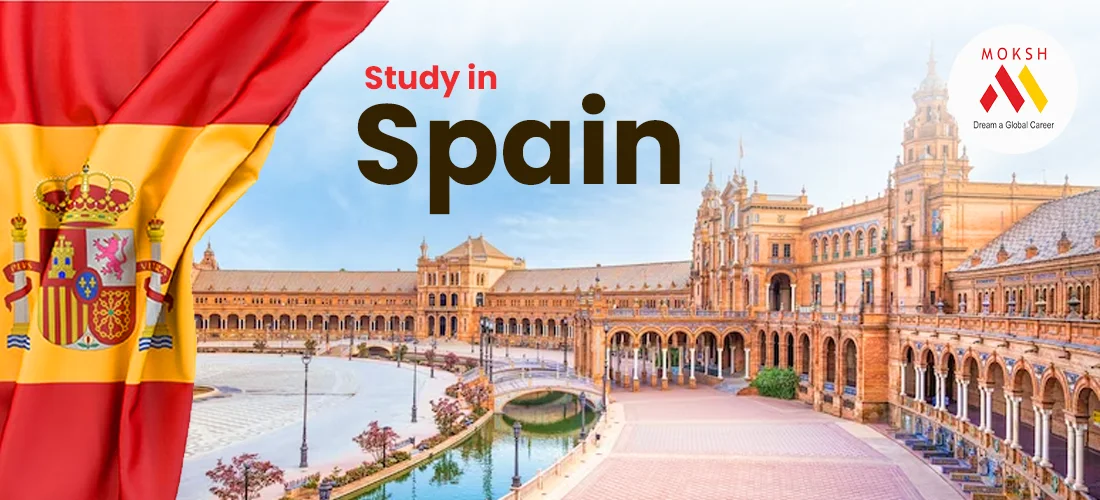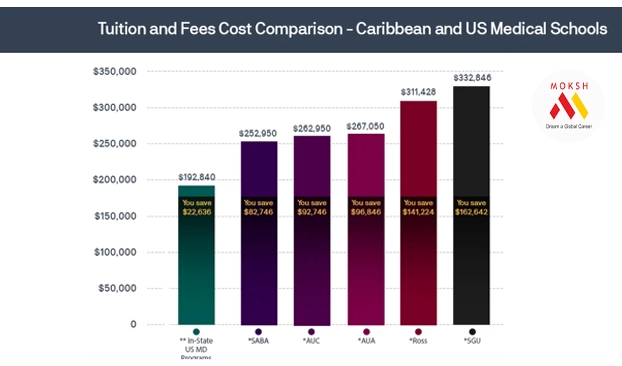
Introduction to Spain
Spain's allure lies not only in its picturesque beauty but also in its deeply rooted history and vibrant culture, frequently celebrated through its architectural marvels, diverse cuisine, and pleasant weather conditions. Indeed, a sought-after location for education in Europe, Study in Spain holds high appeal for various reasons.
Located on the Iberian Peninsula, bordered by France and Portugal, Spain offers a diverse range of landscapes, from pristine beaches to majestic mountains. In addition to its geographical diversity, the country's culture is equally rich and varied. Each semi-independent region within Spain has its own distinctive cultural identity, adding to the country's overall charm.
Quick Facts
| Factor | Details |
|---|---|
| Country | Spain |
| Population | 48 million |
| Capital city | Madrid |
| Official language | Spanish |
| Currency | Euro (€) |
| Major cities | Madrid, Seville, Barcelona, Valencia |
| Total universities | 89 (public: 50, private: 39) |
| Total international students | 250,000+ (Indian students: 1,300) |
| Programs | Bachelor's, master's, doctorate |
| Medium of instruction | Spanish, Catalan, Basque, and English |
| Part-time job hours | 20 hours per week |
| Top 5 universities | Autonomous University of Barcelona University of Barcelona Autonomous University of Madrid Complutense University of Madrid Pompeu Fabra University |
| Living cost for students | €700-800 per month |
Roadmap
- Exploring Education in Spain
- Why Study in Spain? Top 10 Reasons
- Pros and Cons of Studying in Spain
- Best Universities in Spain for International Students
- Popular Study Abroad Programs in Spain
- Cost of Studying in Spain: Tuition, Living Expenses and Scholarships
- Work While Studying in Spain
- How to Apply to Study Abroad in Spain
Exploring Education in Spain
The Spanish education system is a decentralized system, with the national government and the governments of each of the 17 autonomous regions sharing responsibility. Primary and secondary education are compulsory and free for all children ages 6 to 16. After secondary education, students will be awarded a graduation certificate and can proceed to higher education.;
Post-secondary education in Spain is the stage of education that follows compulsory secondary education (ESO). It is not mandatory, but it is required for students who want to attend university.
There are three main pathways in post-secondary education:
- Bachillerato: A two-year program that prepares students for university. Students can specialise in one of three modalities: Science and Technology, Humanities and Social Sciences, or Arts.
- Vocational education and training (VET): A two-year program that prepares students for specific careers in tourism, hospitality, healthcare, and other fields.
- Universities: Higher education institutions that offer undergraduate and postgraduate degrees.
Student life in Spain
Studying in Spain provides a wide array of educational programs available in both English and Spanish. Acquiring proficiency in Spanish enhances your ability to interact effectively with the local population and equips you with linguistic proficiency in one of the world's most commonly spoken languages.
In specific regions like Catalonia, mastering a few local phrases (in this case, Catalan) would be advantageous.
Living as a student in Spain is a unique experience that is hard to replicate. The country's student community is dynamic and diverse, offering numerous opportunities to form lasting friendships.
Students in Spain are known for their diligence, but they also know how to maintain a work-life balance. If you decide to explore the nightlife, be prepared for a siesta in the afternoon, as most clubs don't start operations until past midnight, and the lively atmosphere often lasts till dawn!
Best Universities in Spain for International Students
Spain is home to 89 universities, of which 50 are public and 39 are private. Many of these Spain universities ranking are highly rated worldwide, and there is an increasing shift towards offering more degree programs in English. Renowned public universities in Spain include the University of Barcelona, Complutense University of Madrid, and Autonomous University of Madrid.;
Spain is also home to the Universidad de Salamanca, one of the oldest universities in the world. The country is also known for its top-tier business schools, with three among Europe's top 10: IESE Business School, IE Business School, and Esade Business School.

1.University of Barcelona
The University of Barcelona stands out as a leading Spanish institution, providing excellent and cutting-edge education across diverse fields like health, social sciences, humanities, engineering, and experimental sciences. With a sizable student population of over 64,000, including over 12,000 international students, it offers a richly diverse and multicultural learning environment. Furthermore, the University of Barcelona is a cost-effective option for students seeking quality education in Spain.

2. Autonomous University of Madrid
The Autonomous University of Madrid (UAM) is a top university in Spain with comprehensive student training and global recognition. It provides a diverse selection of academic programs in areas like science, philosophy, psychology, business, law, medicine, and education. UAM also offers many courses in English for international students. UAM has many cultural activities and sports facilities.

3. Complutense University of Madrid
Complutense University of Madrid provides education in various fields through its 26 faculties, such as fine arts, biology, medicine, psychology, veterinary science, statistics, and teaching. While most courses are in Spanish, some are also available in English and Catalan. The university welcomes students from over 80 different countries who are pursuing undergraduate, graduate, and doctoral degrees.

4. Autonomous University of Barcelona
The Autonomous University of Barcelona is one of the best public universities in Spain to study at. It provides a variety of courses in fields like arts, sciences, biology, healthcare, social sciences, law, and engineering. These courses are available at all levels, from bachelor's to doctorate. Many master's and postgraduate degrees are also offered in English or online. The university has over 34,000 students, of which 37.7% are international students in master's and doctoral programs.

5. University of Navarra
The University of Navarra is a private university in Pamplona, Spain. It offers degrees in many subjects, including architecture, communication, humanities, social sciences, medicine, and theology. The university's mission is to educate students academically, culturally, and personally. It also emphasises the importance of academic research in all fields of knowledge to promote social innovation and development.

6. University Pompeu Fabra
Pompeu Fabra University is well-known as one of Spain's top universities. This public university in Barcelona provides degrees in a variety of faculties. Students will find their preferred field of interest at Pompeu Fabra University, whether in the health and life sciences, linguistics, or engineering. This university also provides the option of blended learning, a combination of online classes and traditional classroom methods.

7. University Carlos III of Madrid (UC3M)
UC3M, a Spanish public university, provides English-language programs in response to the strong demand for such courses in Spain. UC3M offers most of its undergraduate programs in English or a bilingual format. In English-taught degrees, students complete their entire degree in English, while in bilingual degrees, half of the subjects are taught in English. UC3M's goal is to make a meaningful contribution to society through teaching and research.

8. University Polytechnic of Catalunya
The Polytechnic University of Catalonia (UPC) is Catalonia's leading engineering university, known for its excellent teaching and research. It is one of the top universities in Spain, with over 28,000 students enrolled in its degree programs. UPC offers 75 master's degree programs, of which 29 are taught in English and 27 are double degrees. The university specialises in architecture, engineering, science, and technology, providing world-class education and expertise.

9. University Polytechnic of València
The Polytechnic University of Valencia (UPV) is a leading Spanish university for science and technology. The university provides bachelor's and master's degree programs in several areas, such as architecture, engineering, business management, and fine arts. UPV is ranked among the top technological universities in Spain, offering courses in Spanish, Valencian, and English. With over 400 subjects taught in English and state-of-the-art computer equipment, UPV is an excellent choice for international students.

10. IE University
IE University is a private college that offers degrees in various subjects like math, computer science, and law. It's super diverse, with 75% of students from 130 countries. As a result,;you'll meet people from all over the world and learn from top experts. You have campuses in Madrid and Segovia, making it one of Spain's best international universities.

11. Polytechnic University of Madrid (UPM)
The Polytechnic University of Madrid, sometimes called the Technical University of Madrid, is situated in Madrid and was founded in 1971. Even though it's a relatively recent institution, some of its component schools have been around for over a hundred years. You united to form the Polytechnic University of Madrid, with the School of Architecture, established in 1752, being the oldest among them. Students here receive a top-notch education and have bright career prospects.

12. University of Alcalá
The University of Alcalá, located 35 km northeast of Madrid in Alcalá de Henares, is one of Spain's top universities known for its outstanding teaching and tradition. With over 29,000 students and 1,600 professors and researchers, you offer various programs like humanities, social sciences, and engineering. Their focus on international relations and excellent facilities make the University of Alcalá stand out.

13. University of Granada
The University of Granada, one of Spain's most prominent universities, has over 80,000 students. It's known for its high quality. Established in 1531, this public university in Granada is dedicated to sharing knowledge and skills. Likewise, it prepares students for success in the job market—the University of Granada values research, global connections, and equal opportunities for everyone.

14. University of Zaragoza
The University of Zaragoza, established way back in 1542, is one of Spain's oldest universities. It provides various degree programs, such as business administration, fine arts, biotechnology, architecture, English, philosophy, engineering, mathematics, journalism, and medicine, making it a favoured option for over 30,000 students, including international ones.

15. University of Sevilla
University of Seville University, situated in Seville, Spain, is among the top universities in the country. With about 87 bachelor's programs, 93 master's programs, and 32 doctoral programs, it also provides over 50 international study options. Having been established as Colegio Santa María de Jesús in 1505, the University of Seville boasts a history of more than five centuries in education. Currently, it has a student body of over 50,000 in its various degree programs.
Popular Study Abroad Programs in Spain
Spain is a sought-after destination for students worldwide, renowned for its top-tier universities and diverse course offerings. It's an ideal locale to pursue a variety of degrees, including an international relations degree or an MBA in Spain. With career-focused programs available at both undergraduate and postgraduate levels, opportunities abound for academic advancement. Whether you're eyeing a master of education or any other masters degree, Spain's educational landscape can provide the perfect platform for your aspirations.
Let's explore some of the favoured study areas for international students in Spain:
- Engineering
- Management and Administration
- Languages
- Humanities
- Law
- Health Sciences
International students can study at all levels in Spain. Bachelor's degrees typically take 3-4 years to complete, master's degrees take 1-2 years, and doctoral degrees take 3-4 years.
Law Programs
The Spanish law degree is globally recognised. The law programs in Spain focus on Spanish, European Union, and United States legal systems. When you decide to study law in Spain, know it will take around five years to complete this program. After this step, you must proceed with a two-year training period.
Earning a law degree opens up many career possibilities, like working as a legal assistant, educator, attorney, legal officer, or corporate lawyer. In Spain, law graduates can look forward to decent pay, usually beginning at €1,500 per month. The average income for lawyers in Spain hovers around €3,250, and the highest earners can bring in as much as €5,000 per month.
Here are the top law schools in Spain:;
- Complutense University of Madrid
- Pompeu Fabra University
- University of Barcelona
- University of Navarra
- University of Valencia

Arts and Humanities
Arts and humanities courses in Spain teach you about fine and performing arts, such as painting, music theory, and sculpting. They also help you develop critical thinking, analytical skills, and creativity. Thus, it qualifies you for many industries, such as education, media and communications, art and design, and creative and cultural sectors.
Job opportunities are broad and varied. You could work as a teacher, journalist, artist, designer, or creative professional. In the creative and cultural industries, you could use problem-solving and creativity to connect ideas and concepts.
Salaries in Spain vary depending on the job. The basic salary is around €1,000 per month, but the average salary can be as high as €3,500 per month.
Top universities in Spain for arts and humanities:
- Pompeu Fabra University
- University of Basque Country
- University of Granada
- Autonomous University of Barcelona
- University of Valencia
Marketing and Finance
Studying marketing and finance in Spain is a fantastic choice due to the wide range of courses available at all educational levels. Marketing education covers both traditional and modern sales and promotional techniques. Finance is equally crucial in teaching how to manage and monitor financial matters effectively.
Both marketing and finance fields are highly sought after in Spain, offering numerous job opportunities. Marketing roles include brand manager, account executive, copywriter, and marketing manager. Finance positions encompass accountant, financial analyst, and investment banker.
In Spain, the average monthly salary for marketing professionals is approximately €3,500, while finance professionals earn around €2,800 monthly.
Here are some of the top universities in Spain that offer marketing and finance programs:
- ESIC School of Business and Marketing Management
- Pompeu Fabra University
- Marbella International University Centre
- Polytechnic University of Cartagena
- EU Business School Spain
STEM Degrees
STEM degrees cover science, technology, engineering, and mathematics. STEM programs teach you to research and solve problems. Engineering programs include civil, electrical, and computer engineering. Science programs include biology, veterinary medicine, and animal science. STEM degrees can help you build bridges, keep IT systems safe, and more.
STEM careers are growing. Math jobs are increasing daily. Science jobs are also multiplying, with many options, such as biomedical research, psychology, energy management, and environmental protection. For example, a life scientist in Spain can earn a monthly salary of €2,500 to €7,000.
Top universities in Spain offering STEM programs:
- Polytechnic University of Catalonia
- Polytechnic University of Madrid
- University of Barcelona
- Polytechnic University of Valencia
- University of Seville
Spanish Language Courses
Studying Spanish in Spain is a fantastic and enjoyable learning experience. Many high-quality schools in Spain offer courses for all skill levels. You can choose from various language and culture classes throughout the year, all following the Common European Framework of Reference for Languages (CEFRL).
A Spanish degree opens up many career paths. Beyond teaching, like being a bilingual educator or college professor, you can explore opportunities in business, culture, tourism, or government. A Spanish degree also provides decent earning potential. For instance, Spanish teachers usually start with a monthly salary of €1,200, though income varies by profession.
Here are the top universities in Spain that offer Spanish courses:
- University of Salamanca
- University of Barcelona
- University of Malaga
- University of Alicante
- University of Santiago de Compostela
Hospitality Management
With a hospitality management degree, you'll learn how to create and manage customer relationships and understand how the food and beverage, travel, and event management industries work together to provide quality service.
Following your graduation, there are several career options in the hospitality industry in Spain, like tourism, entertainment, food services, and guest relations. Your monthly earnings can vary, ranging from €900 to €5,000, depending on the specific job you pick.
These are the best universities in Spain if you want to study hospitality management:
- European University of Madrid (UEM)
- EU Business School
- ESEI International Business School
- Hotel Management and Culinary Arts School in Sant Pol de Mar;;(UCH)
- San Antonio de Murcia University (UCAM)
Universities in Spain without IELTS
Many times, students ask, How to Study in Spain without IELTS?
Spain is not an English-speaking country. As most of the universities will ask for your English proficiency Certificate, there are still a few Univ which don't ask for such certificate. You need a certificate of your education medium in English. Below is the list of Universities in Spain where you can study without IELTS
- Universidad Antonio de Nebrija
- Pablo de Olavide University
- Pablo de Olavide University
- University of Valencia
- University of Salamanca.
Cost of Studying in Spain
International students are drawn to Spain, partly thanks to its low tuition fees.;
- Public universities in Spain charge between €750 and €2,500 per year for bachelor's programs, and between €1,000 and €3,500 per year for master's programs.;
- Private universities choose how much you charge for tuition, and it can be up to €20,000 per year.
| University Type | Bachelor's Tuition (€) | Master's Tuition (€) |
|---|---|---|
| Public | 750-2500 | 1000-3500 |
| Private | Up to 20,000 | Up to 20,000 |
Study in Spain for free
How to Study in Spain for Free?;
Public universities in Spain are very affordable, with tuition fees ranging from €750 to €2,500 per year for EU students and from €1,500 to €4,000 per year for non-EU students. There are a number of ways to study in Spain for free or at a reduced cost, including scholarships, tuition waivers, work-study programs, and low living expenses.
Can you Study in Spain in English for Free?
A number of universities in Spain that offer English taught degree programs in Spain, some of which are free for international students. For example, the University of Alcalá, the Autonomous University of Barcelona, the Complutense University of Madrid, the University of Granada, and the University of Valencia all offer free English-taught degree programs.
Some universities in Spain even offer tuition-free degrees to international students. However, it is important to note that tuition fees at these universities may vary depending on the degree program and the student's nationality. Students should contact the universities directly to inquire about tuition fees and other financial aid opportunities.
Cost of living in Spain
You can enjoy a good student life in Spain without spending too much. Food is affordable and good quality, and there are many cheap clothing stores. While housing in big cities like Madrid and Barcelona can be costly, public transport is budget-friendly and dependable.
You might want to think about living in more affordable cities like Valencia or Seville. Check the table below for average monthly student expenses in shared housing in major Spanish cities:
| City | Shared Accommodation | Misc. |
|---|---|---|
| Madrid | 400-500 €; | 200-300 € |
| Salamanca | 300-400 € | 200-300 € |
| Córdoba | 300-400 € | 200-300 € |
| Barcelona | 400-500 €; | 200-300 €; |
| Seville | 350-400 € | 200-300 € |
| Granada | 350-400 € | 200-300 € |
Scholarships to Study in Spain
Even though Spain does not have expensive tuition fees at its higher education institutes, some students may still need help affording education there. To help students get a good education without financial issues, the Spanish government and other external organisations make various scholarships, loans and grants available to overseas students. These may cover travel costs, tuition fees, stationary, etc.
Scholarships for studying in Spain:
- Fulbright Scholarship
- Spanish Studies Abroad Financial Aid
- Erasmus Mundus Scholarship
- UIC Barcelona Scholarship
- CIEE Scholarships and Grants
Additionally, there are Erasmus Mundus Scholarships for joint master's programs, La Caixa Foundation Scholarships for master's degrees, and Santander Scholarships for bachelor's and master's programs.
Requirements to Study in Spain
Each university and program in Spain has its own requirements, yet there are some common study in Spain requirements:
- Application form
- Valid bachelor's degree from a recognised university
- Official records of your qualifications and certificates, including any university entrance exams passed
- English language proficiency test score (IELTS score of min. 5.5)
- Letter of motivation or statement of purpose
- Letter of recommendation
- Curriculum vitae (CV)
- Copy of your passport
- Passport photo
Admission Process in Spain
Key Steps for International Students Planning to Study in Spain:
- Begin the admission process early for ample time for document and exam preparation.
- Thoroughly research universities and program requirements.
- If you're from outside the EU/EEA, have your qualifications recognised by the Spanish Ministry of Education.
- Apply directly to your chosen universities; no central application system exists for international students.
- Prepare for entrance exams like Selectividad or DELE, which many Spanish universities require.
- Budget wisely, as tuition fees for international students in Spain can be substantial."
Admission Intake in Spain Universities
The autumn semester is when most students start in Spanish universities. To secure your spot, apply early. The spring semester is less crowded and works well if you still need to complete the autumn deadline or require extra time to prepare your application.
| Intake | Admission Deadline | Last date to apply |
|---|---|---|
| Fall | 1 June 2023 | 15 July 2023 |
| Spring | 1 December 2023 | 15 January 2024 |
Part-time work for international students in Spain
Finding employment as an international student in Spain can be challenging, as most companies prefer fluent Spanish employees, and most jobs are full-time. So make sure you explore such part-time employment opportunities which do not have their schedule clashing with your classes.
Students can do part-time work as:
- English teachers
- Hospitality workers
- Tourism workers
- Freelance writers and translators
- Social media managers
Post-study work permit in Spain:
International students who graduate from Spanish universities can stay and work in Spain for up to one year after graduation. To obtain a post-study work permit, students must first secure a job offer from a Spanish company.;
When you receive a job offer in Spain, you must apply for a work visa from the Secretary of State for Migration (La Secretara de Estado de Migraciones). The application process can take up to 8 months, so it is essential to start planning early.
Documents required for a post-study work permit in Spain:
- Valid passport
- Visa application form
- Job offer letter
- University diploma
- Proof of financial means
- Health insurance policy
If the work permit application is approved, the student can obtain a work and residence visa. This visa will allow them to live and work in Spain for their job contract.
Type of Student Visa in Spain
Different types of Student Visas exist in Spain, and the validity for all of them varies. If you wish to apply for the same from outside Spain, you must apply at a Spanish embassy. You need to hold an offer letter from a university of your choice, and you'll also be required to present essential documents to complete the procedure.;
| Schengen Student Visa Type | Duration | Additional Benefits |
|---|---|---|
| Schengen Student Visa (less than three months) | Less than 90 days | Can travel freely within the Schengen Area |
| Short-Term Student Visa (3-6 months) or 180-day D Type Visa | 3-6 months | Can work part-time while studying |
| Long-Term Student Visa (more than six months) | More than 6 months | Can apply for a post-study work permit |
Nevertheless, submit a student visa application 2-3 months before moving to Spain to smoothen your visa processing time.
Student Visa Requirements
To obtain a Spanish student visa, you will need to submit the following documents:
- Valid passport
- Two recent passport-size photographs
- Letter of acceptance from a Spanish university
- Valid ID
- Proof of health insurance
- Proof of payment of tuition fees
- Proof of sufficient funds to support yourself during your studies
- Medical certificate
Spain Permanent Residence Permit
To obtain permanent residency (PR) in Spain, international students must meet the following conditions:
- Have legally resided in Spain for five consecutive years.
- Possess sufficient financial resources or income.
- Have valid health insurance.
International Student in Spain 2023

In Spain, there are approximately 89 academic institutions, with a student population exceeding 1.6 million. These educational entities are primarily state-sponsored public universities, complemented by many private institutions. Top-tier universities are predominantly situated in Madrid and Barcelona, although other regions also host their fair share of universities.
Over 200,000 of the student body in Spanish universities are international students. According to data from the Indian government, more than 1,500 Indian students are pursuing their studies in various Spanish universities. Year after year, Spain has seen a rise of about 12% in the number of international students.
International students in Spain by Country of Origin
Spain is a magnet for ambitious students across the globe, attracting a multitude of nationalities and cultures to its educational establishments. From Spain to Finland, individuals flock to Spain to attain their qualifications and kick-start their careers.

According to the most recent statistics, the five nations contributing the most significant number of international students to Spain are:
| Country; | No of Students |
|---|---|
| Spain | 21,441 |
| Ecuador | 16,758 |
| France | 16,509 |
| Columbia | 16,460 |
| China | 12,571 |
| India | 1375 |
MOKSH: A reliable consultant to Study in Spain
Studying in Spain is a cost-effective and fulfilling option for international students. However, navigating the admission and scholarship procedures in Spanish universities can take time and effort. That's where MOKSH steps in as your trusted guide. Our experienced counsellors specialise in Spanish university admissions. Reach MOKSH at;9699360370; or via WhatsApp at8269900555for expert assistance. or Visitwww.moksh16.com




